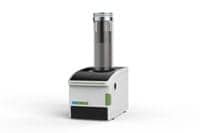Myriad Genetics Inc has signed an agreement to license proprietary technology for the early detection of cancer from Chronix Biomedical of San Jose, Calif. Under the agreement, Myriad has rights in North America, South America, and Europe to commercialize tests derived from the technology for the early detection of breast cancer, colon cancer, and prostate cancer in exchange for upfront fees, milestone payments, and royalty payments based upon the technical and commercial success of the products.
"The technology we have licensed from Chronix Biomedical has the potential to revolutionize the early detection of cancer through the analysis of unique DNA sequences in blood samples," said Mark Capone, president of Myriad Genetic Laboratories Inc. "This acquisition is consistent with our strategy to broaden our preventive care portfolio beyond predictive medicine products for women’s health, and supply health care providers with enhanced tools to catch disease early, when it is most treatable."
In a study of 575 individuals presented at the June, 2010 ASCO meeting, Chronix’s novel technology detected and identified DNA fingerprints in blood samples from patients that indicated the presence of prostate or breast cancer with 92% sensitivity and 100% specificity. Myriad will expand on this initial research with the goal of developing molecular diagnostic products, which are less invasive and significantly outperform the accuracy of current early detection methods.
According to the American Cancer Society, there were an estimated 570,000 newly diagnosed cases of breast, colon, or prostate cancer in 2010, and over 70 million breast, colon, and prostate screening tests are performed annually in the US alone. This early detection technology could supplement and improve these screening tests to provide physicians with a more sensitive test that is able to detect cancerous cells at an earlier stage of development and improve clinical outcomes.
According to the National Cancer Institute, patients diagnosed with early stage cancer have more than a 90% change of surviving for five years while patients diagnosed with later stage cancer have less than a 30% chance of five-year survival. This data underscores the need for early detection and early intervention in cancer.
"We are pleased with the partnership of our technology with Myriad Genetics given their expertise in developing and commercializing molecular diagnostic products," said Dr. Howard Urnovitz, chief executive officer of Chronix Biomedical. "Chronix’s molecular diagnostic technology is transformative; as it is based on the ability to detect, analyze, and identify alterations in specific regions of the human chromosome discharged by damaged or dying cancer cells. The ability to differentiate cancerous versus normal cells in blood will provide an incredibly sensitive screening and monitoring tool."


